Hyundai Kona Electric: an all-electric car that will keep the family entertained
This all-electric SUV has space, tech and plenty of range
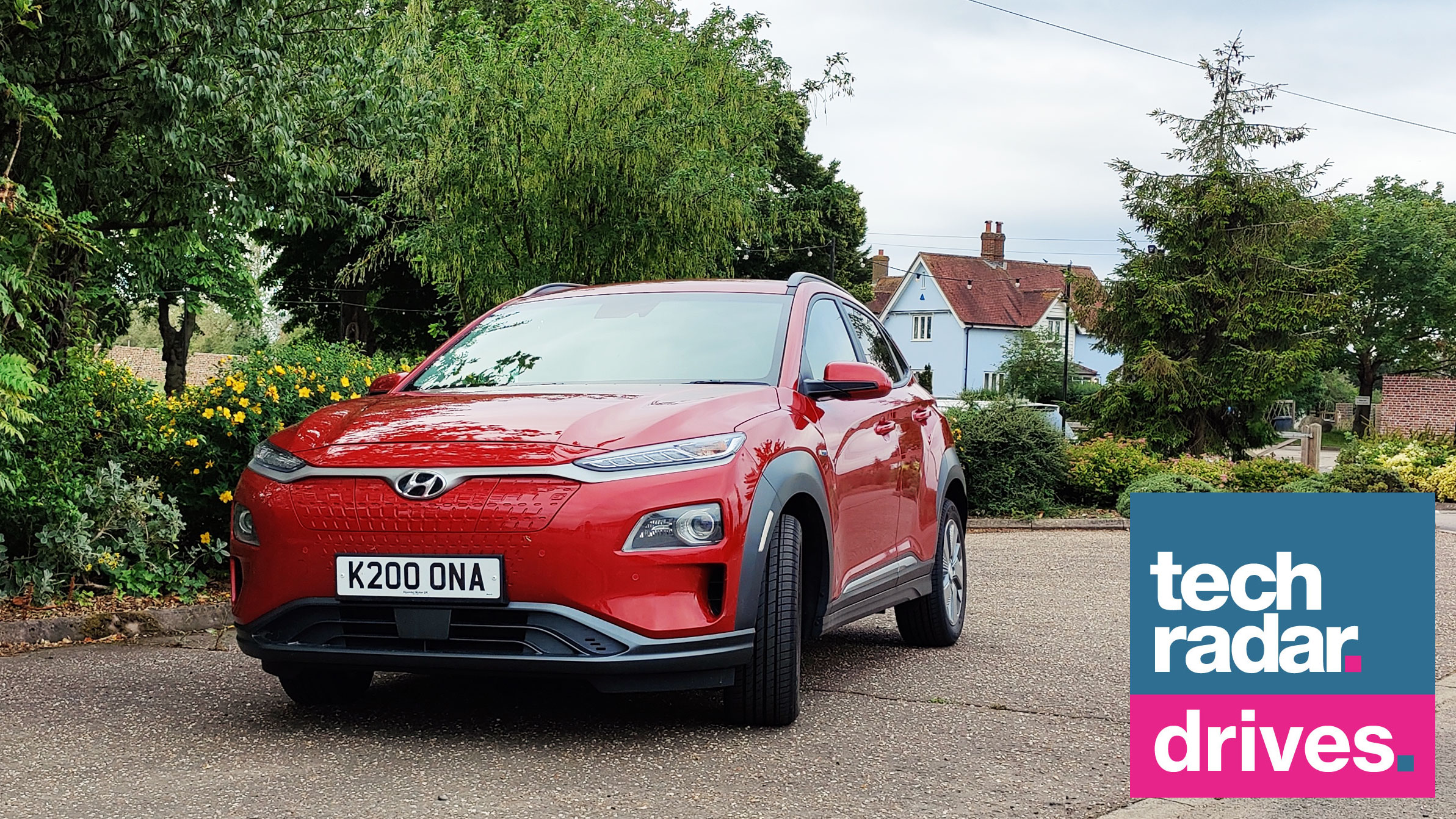
The Hyundai Kona Electric is an all-electric family SUV, offering a decent amount of range and a variety of tech to keep you on the road, engaged and entertained.
It's part of Hyundai's Kona range, with petrol and hybrid options also available if you're not ready to embrace a fully electric car just yet.
Hyundai Kona Electric prices start at $37,190 / £29,900, putting it in direct competition with the Kia e-Niro and making it cheaper than the Ford Mustang Mach-E and Tesla Model Y.
We drove the top-of-the-line Kona Premium SE (Ultimate in the US) model however, which bumps the starting price up to $45,400 / £38,250 and adds all the features from the (middle) Premium tier below it, plus heated and air cooled seats, leather seat trim, full LED headlights, heated steering wheel and a bigger 64kWh battery (vs the default 40kWh option).
Hyundai Kona Electric design and drive
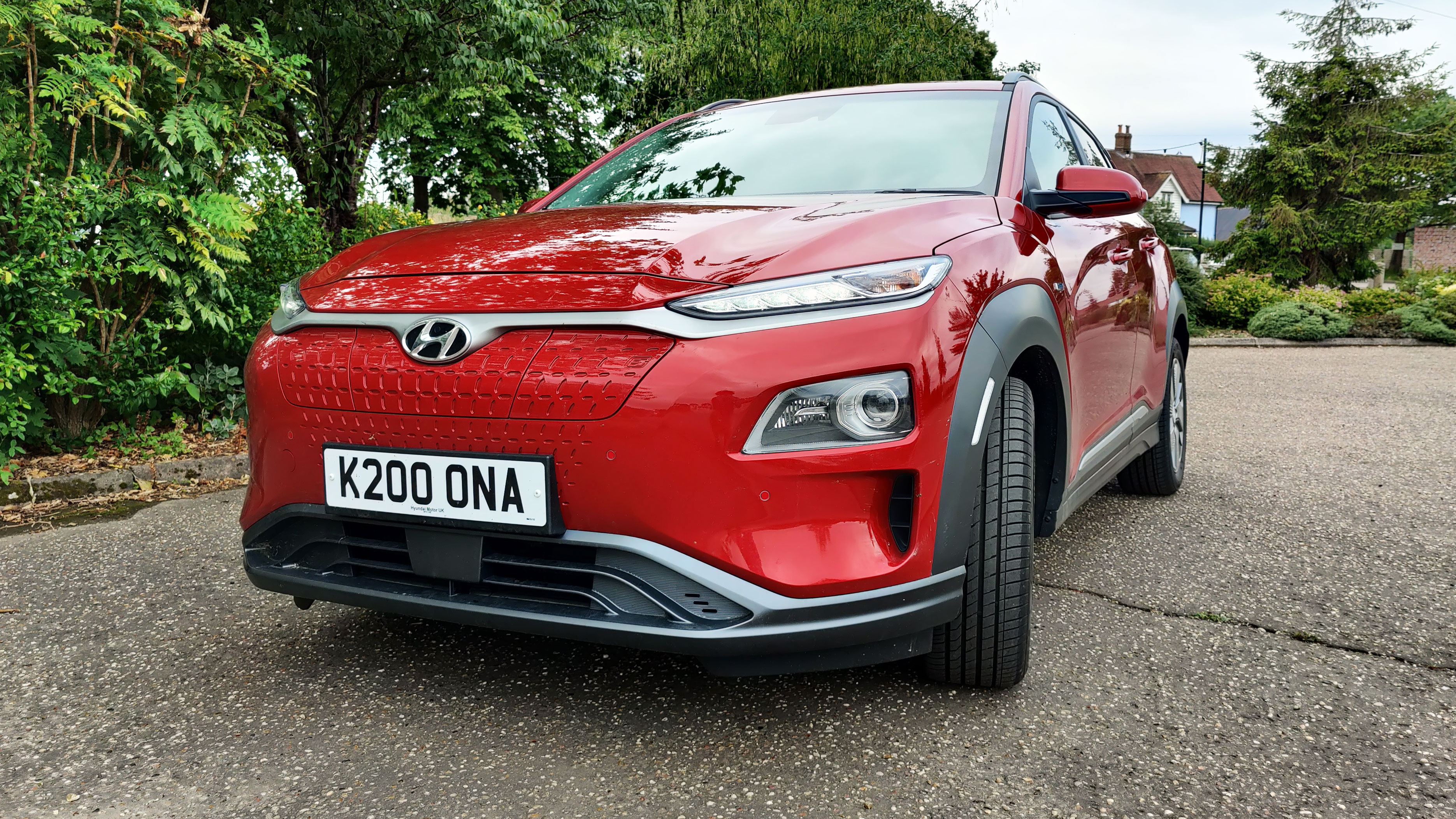
Hyundai Kona Premium SE
Engine: 150kW electric motor
Power: 201bhp
Top speed: 104mph
0-62mph: 7.9 seconds
Range: up to 278 miles
Price: £38,815
The Hyundai Kona Electric falls into the affordable electric car bracket - for SUVs, at least - and the styling fits the price tag.
It may not have the most premium of looks, but the Kona Electric is well proportioned with modern lights and a pleasing body shape. There is an excess of plastic trim around the wheel arches which detract from the overall aesthetic, but it's nothing that isn't expected.
Climb inside and the driving position is spacious and comfortable. There's plenty of headroom, and the electronically adjustable seat provides a good level of support. You get a good view of the road too, from the slightly elevated driving position, which makes things feel safer.
Get daily insight, inspiration and deals in your inbox
Sign up for breaking news, reviews, opinion, top tech deals, and more.
This top-spec Kona Electric Premium SE model has additional creature comforts too, including a heated steering wheel, and heated and air-cooled front seats - ensuring you can always regulate your temperature to the desired level.
There's good news for rear seat passengers too, as the outer two rear seats also get treated to a heating function in this model, and there's enough space and legroom for adults to sit comfortably for long journeys.
The interior is practical, if a little on the cheap side with plenty of plastic on display. We found the interior door panels had a little bit of give in them, and while it shouldn't cause any issues, it's a sign of the Kona Electric's affordable price.
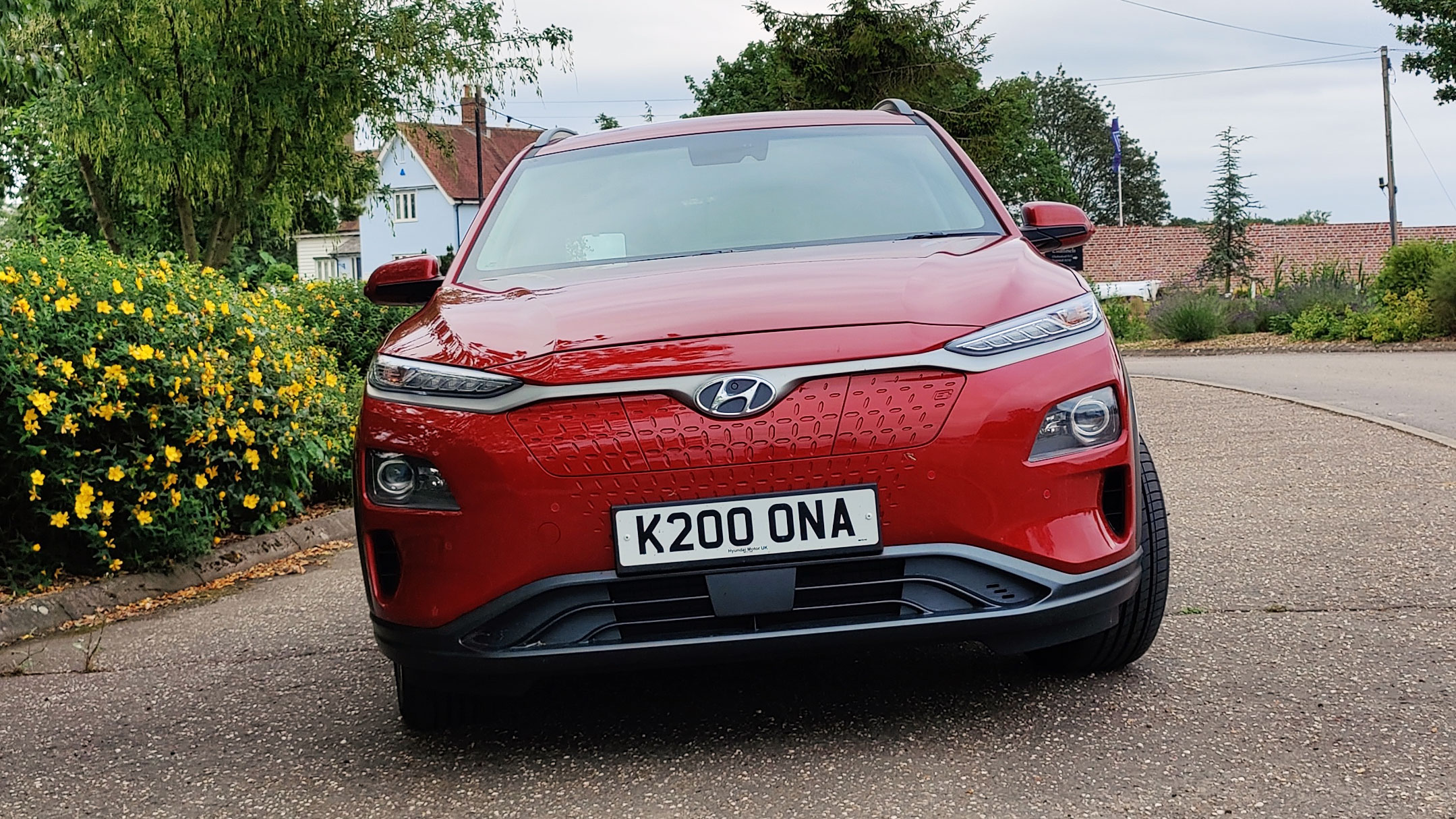
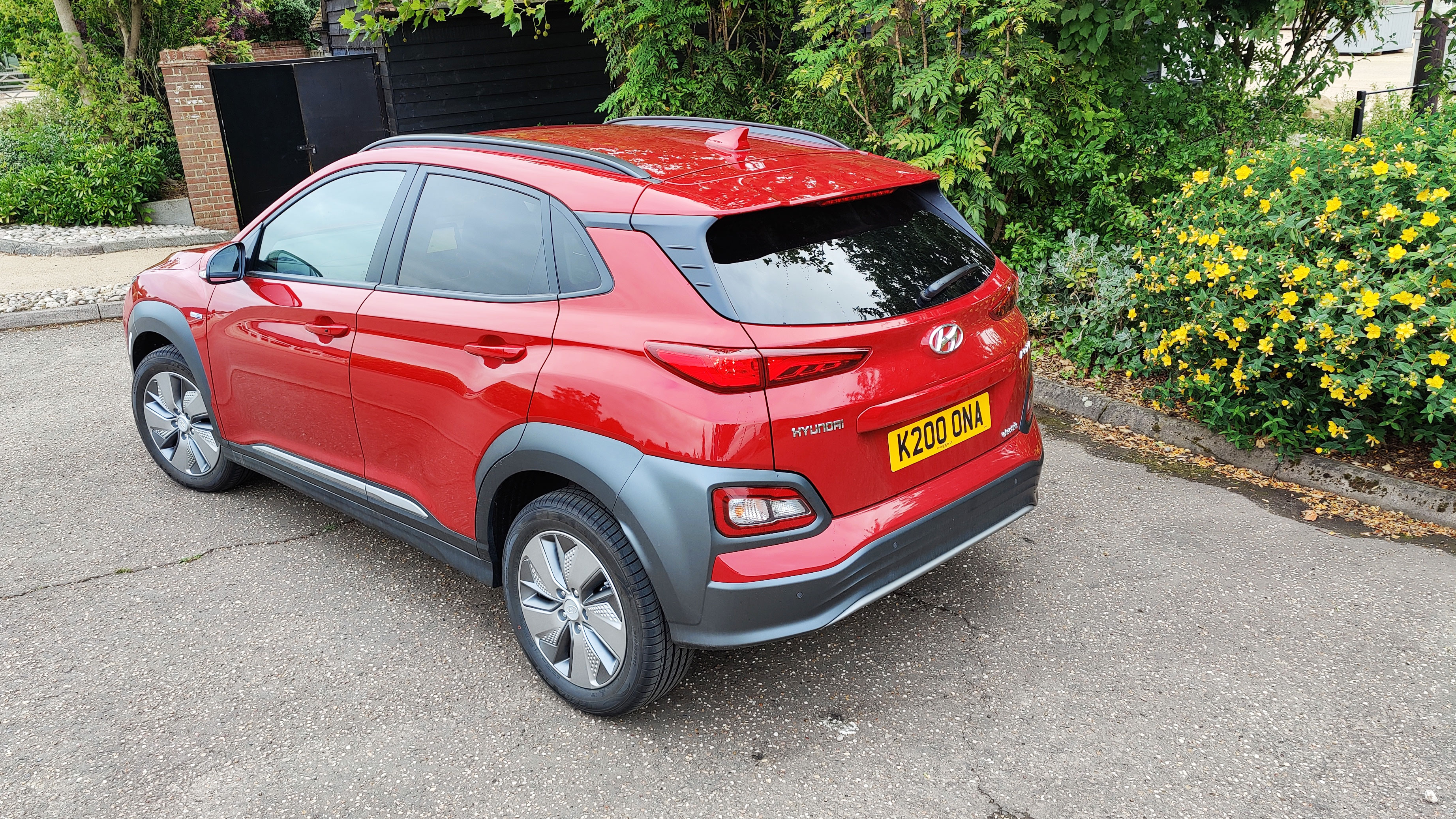
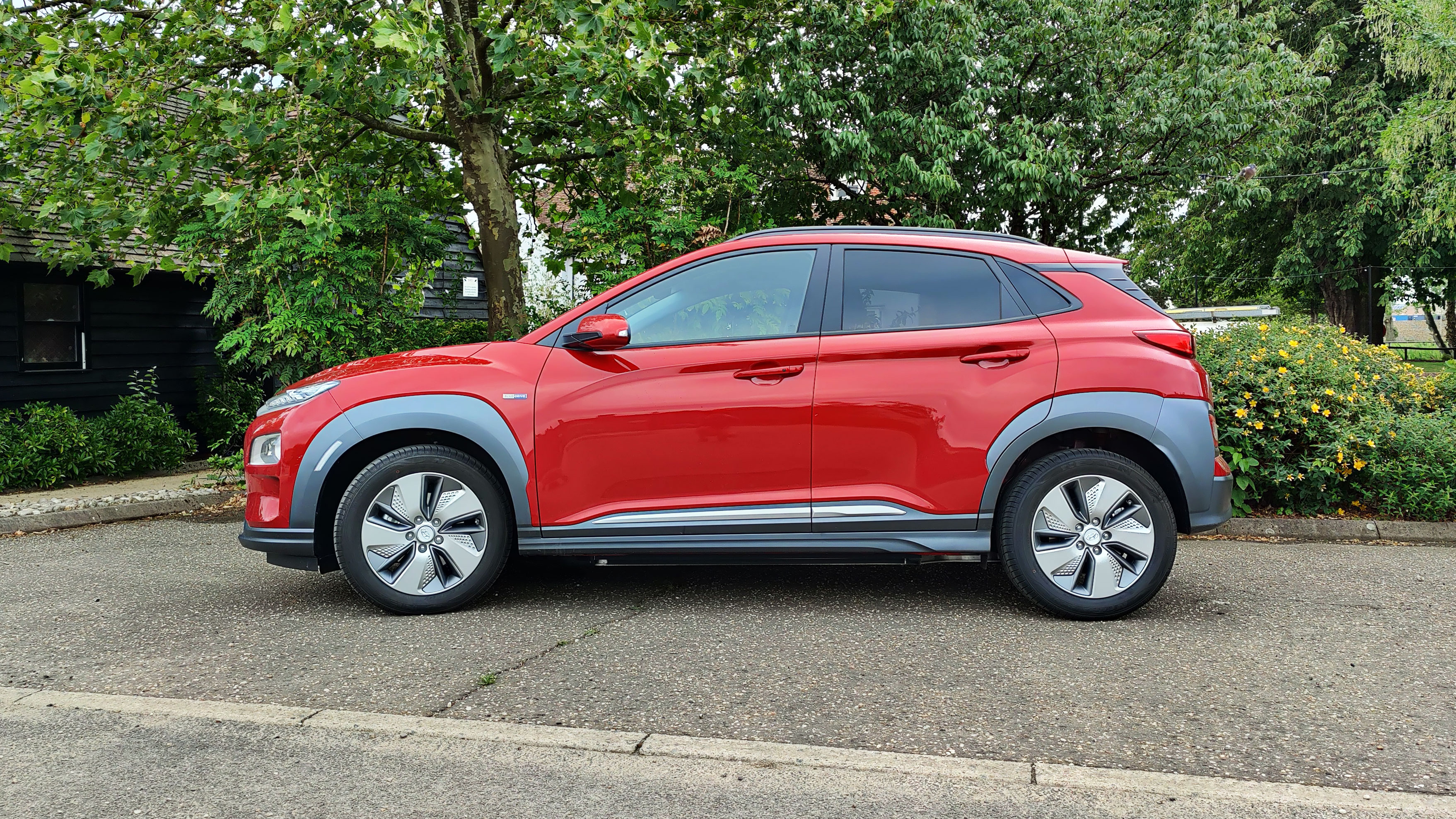

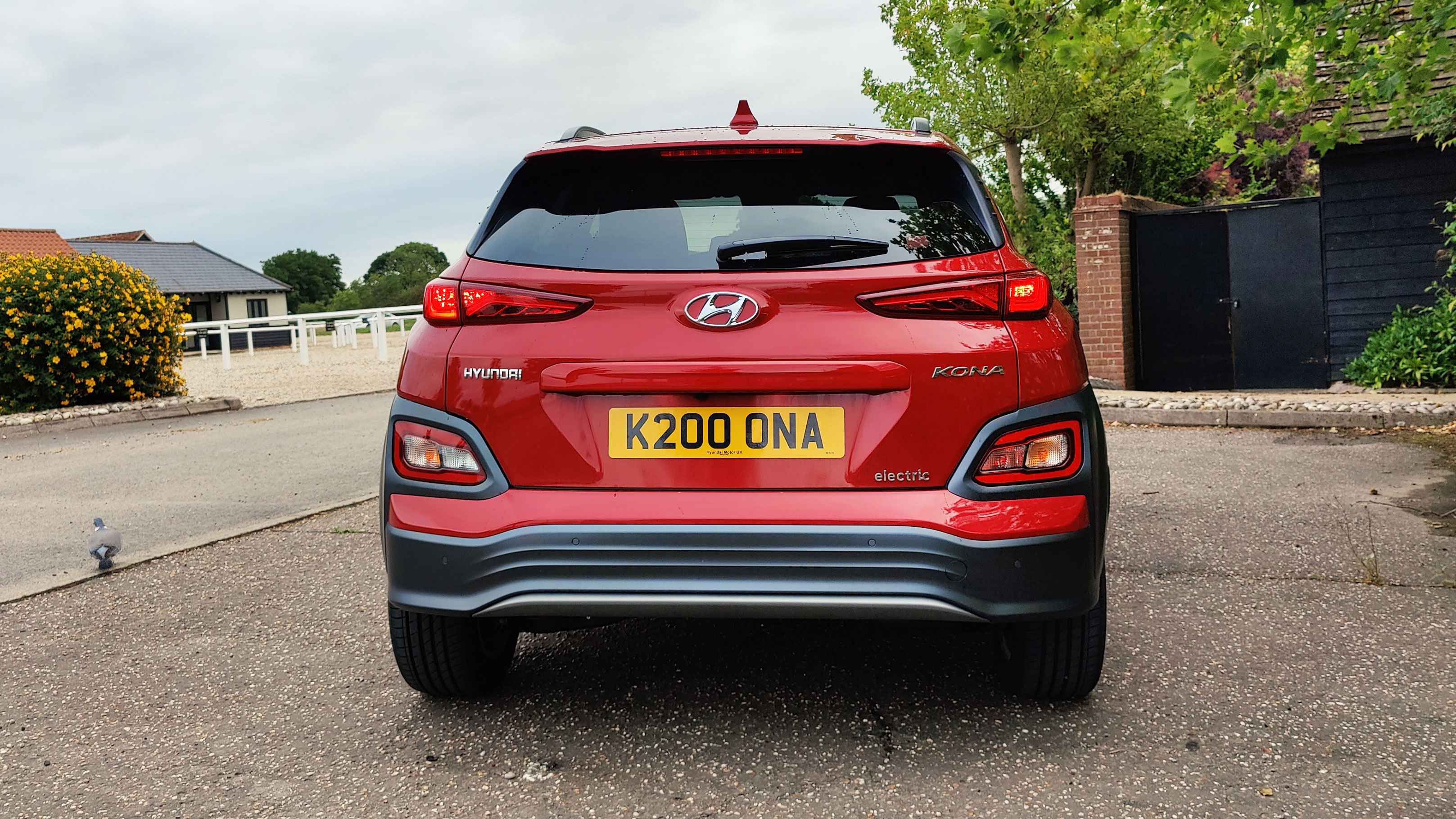
Press the start/stop button, located behind and to the side of the steering wheel, and the system start-up chime lets you know that it's awake and ready to go. As this is an electric car, there's no engine sound, so it's not always obvious that the engine is on.
The silent running of electric cars can be a problem for pedestrians, who may be less aware that a vehicle is on the move. The Hyundai Kona Electric comes with VESS (virtual engine sound system), which plays an audible (and slightly futuristic) tone externally when you're moving, to notify anyone around you that you're not sitting still.
You can opt to turn VESS off - there's a button next to the steering wheel - if you don't want the car humming in a quiet residential area, in the middle of the night, as you maneuver into your drive.
From the driver's seat this additional noise is audible, but it's not overpowering, as it mixes with the general road noise and at higher speeds is drowned out by the latter. The Kona Electric offers a relatively quiet drive, but it doesn't have the same sound dampening as models from the premium brands.
Drive select is supremely simple, with chunky buttons where a gear shift would be offering clear drive, reserve, neutral and park options.
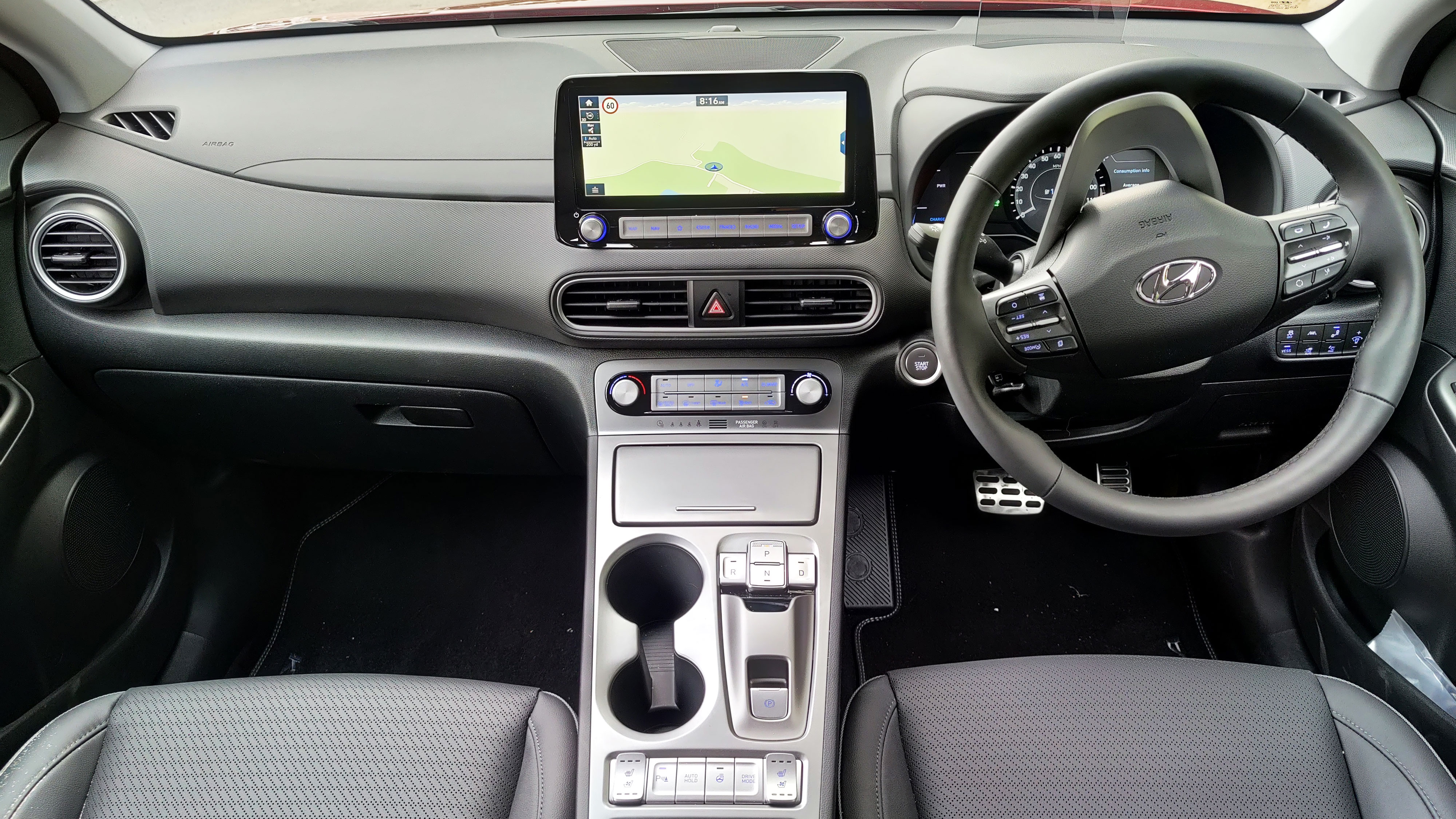
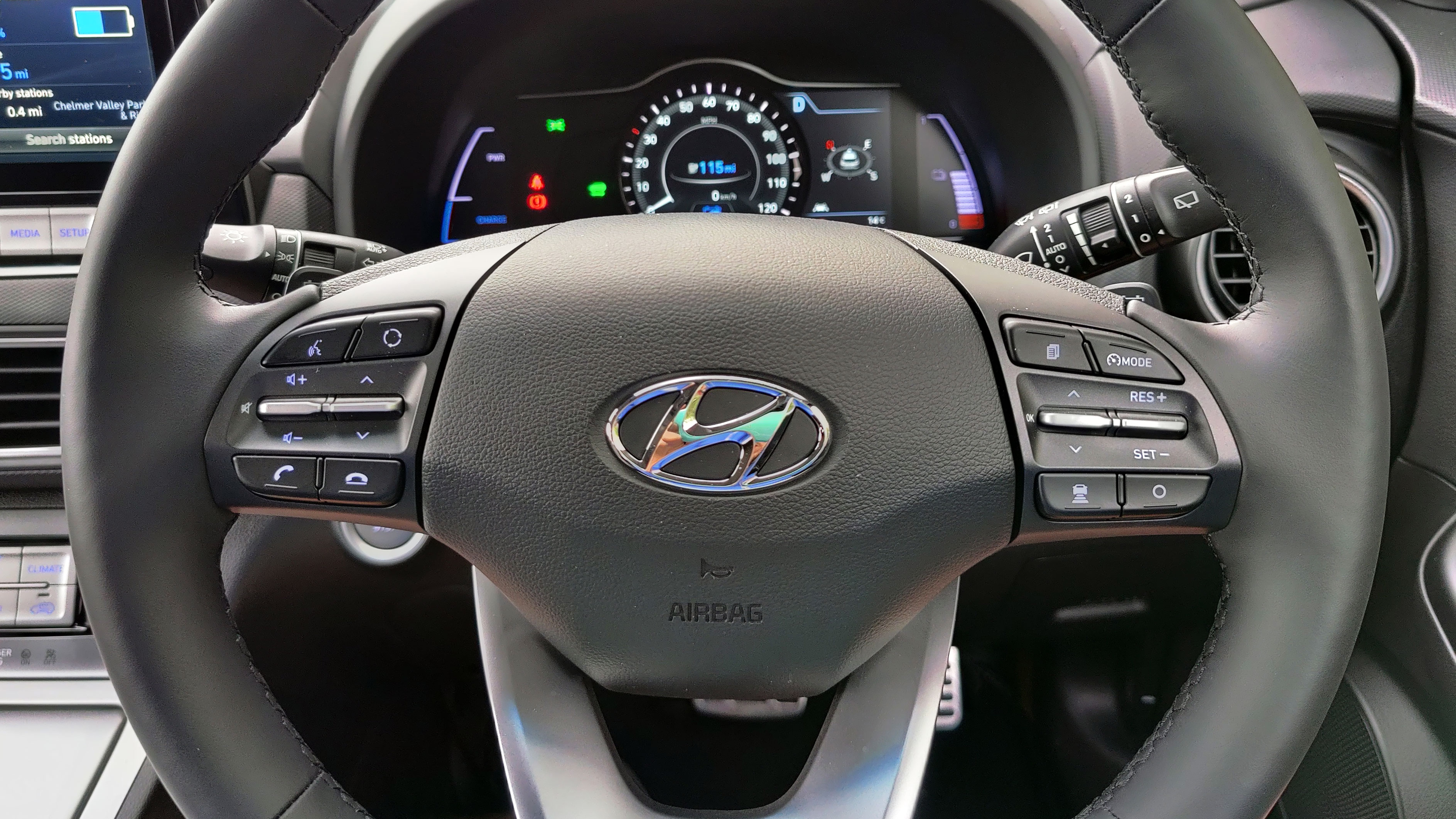
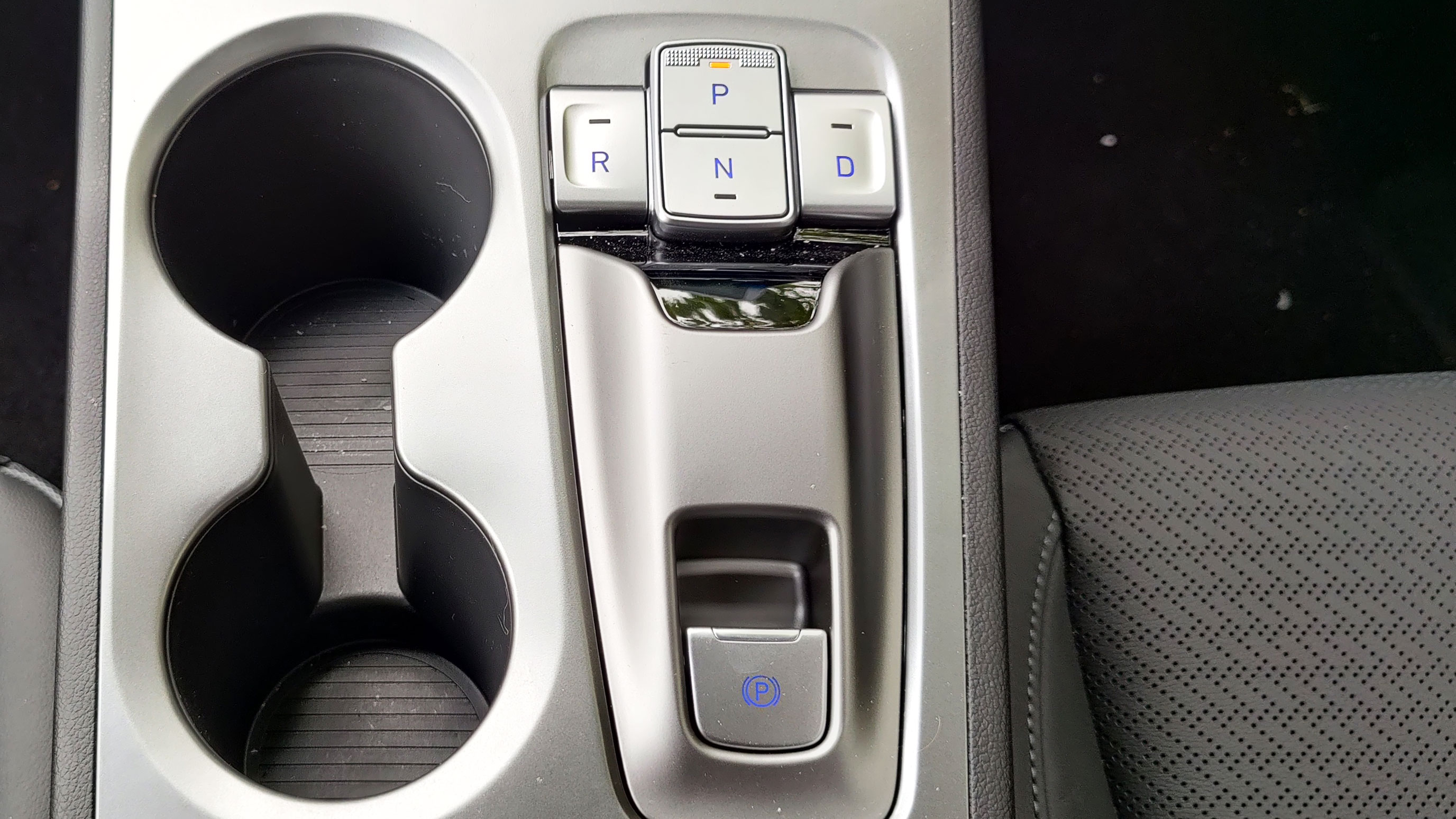
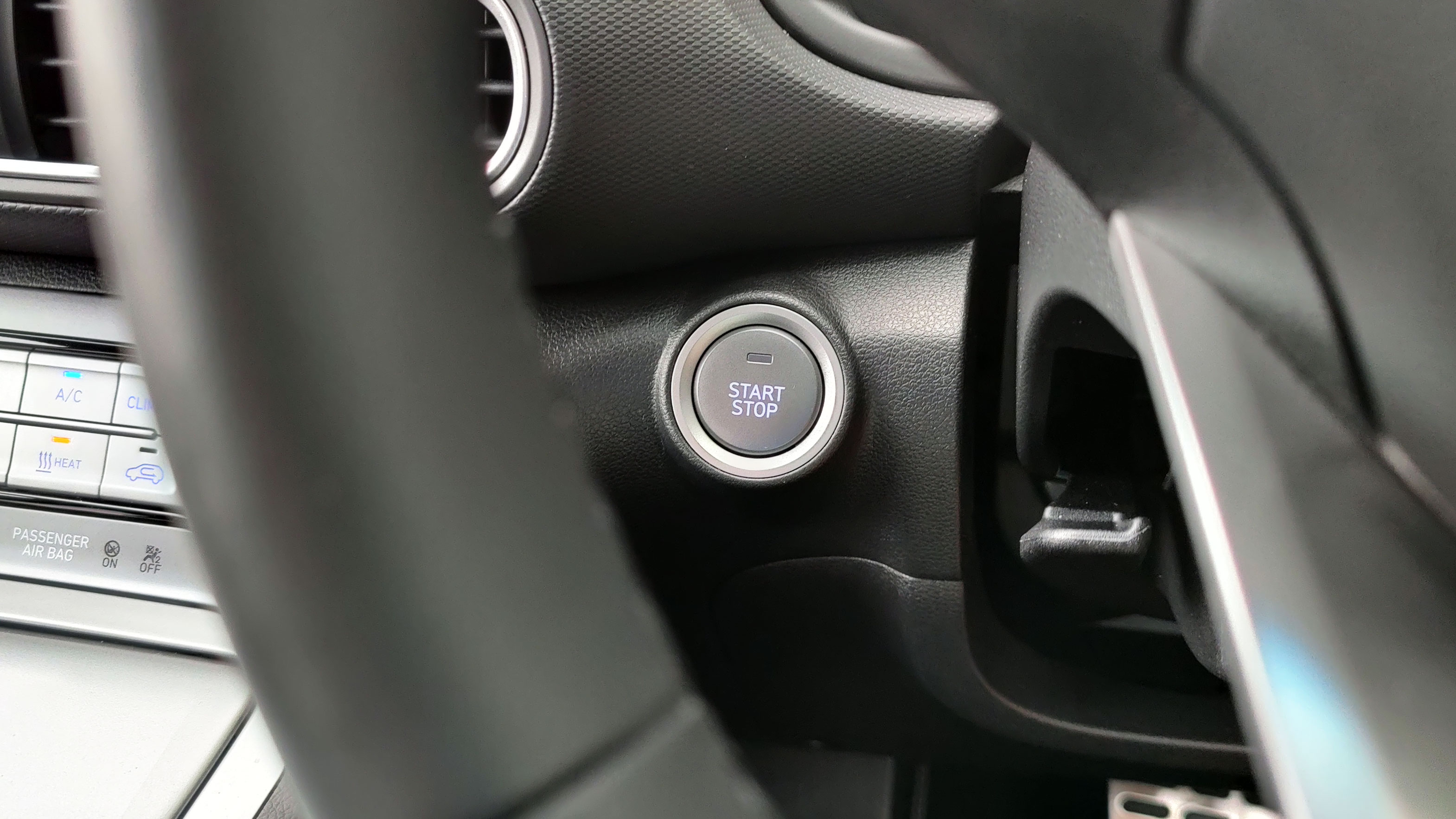
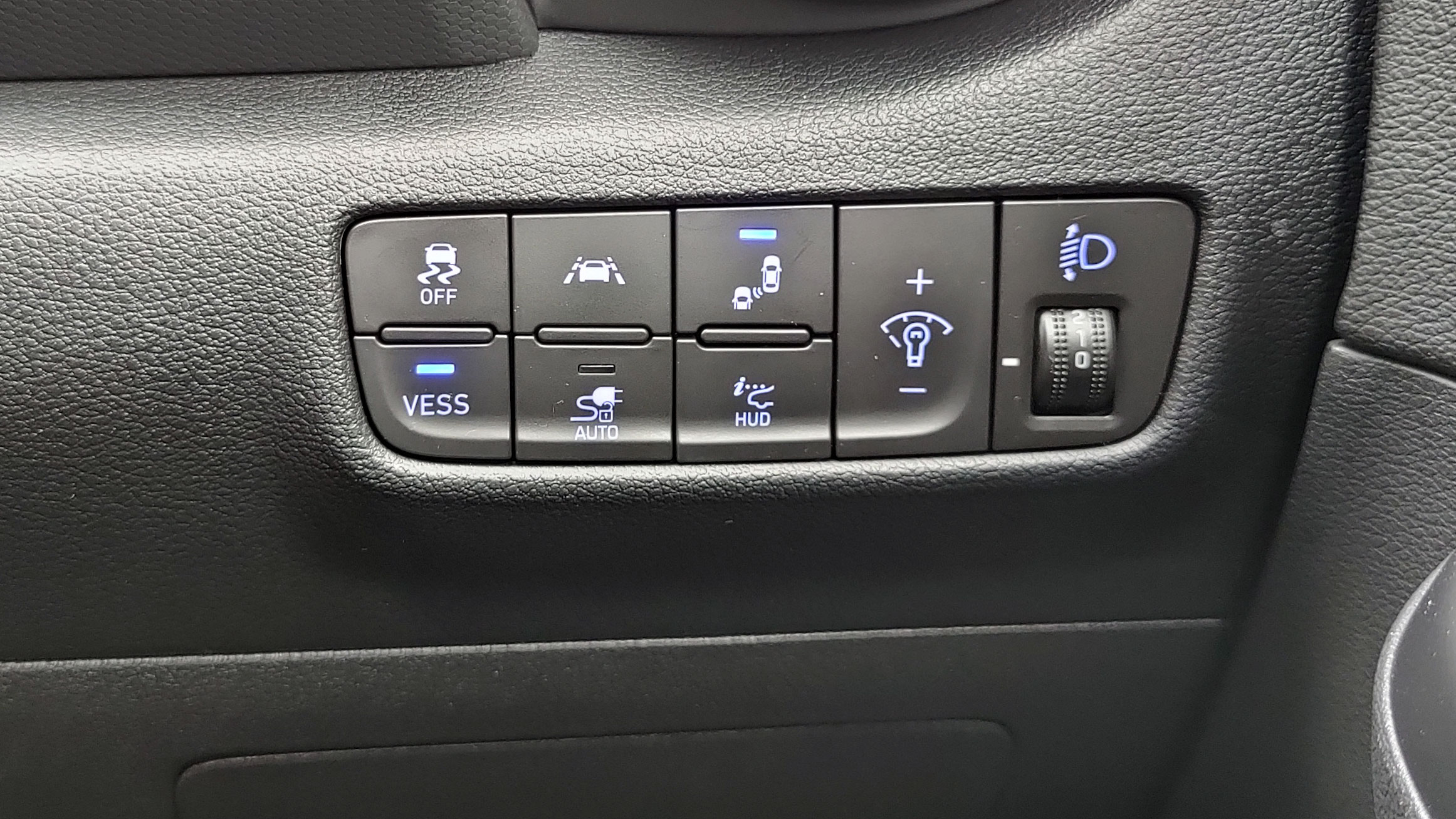
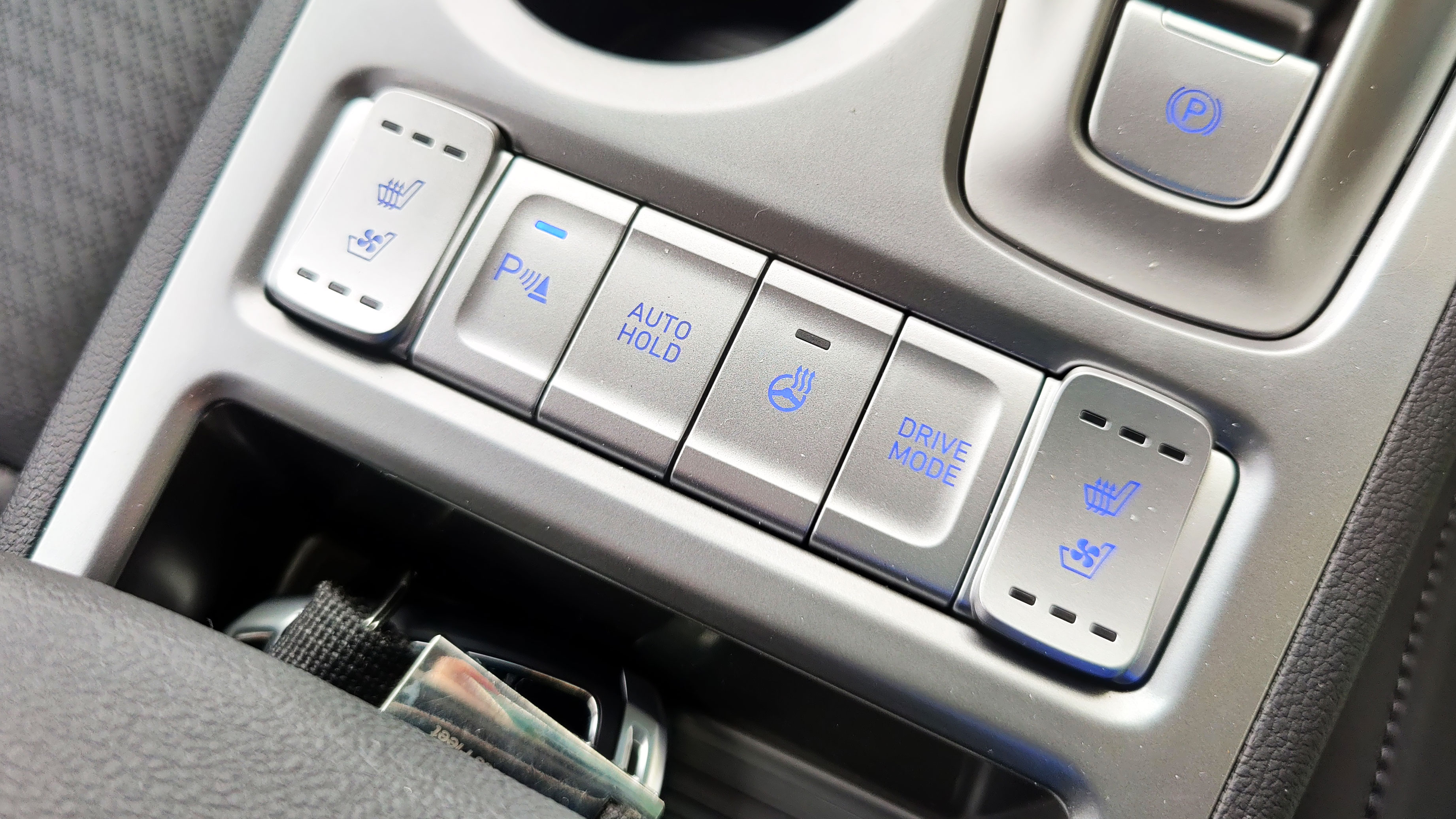
Acceleration is smooth and well balanced. The Kona Electric can get you from 0-62mph in 7.9 seconds, and with 201bhp and a top speed of 104mph there's enough power under the hood to get you away from junctions, and to cruise relatively effortlessly on the motorway.
You'll also find a couple of paddles set just behind the wheel, on the steering column, and these allow you to control the regenerative braking level of the Kona Electric.
If you have regen off, you won't get any regenerative braking until you put your foot on the break, but up the level from 0 to 1, 2 or 3 and the amount of braking when you lift your foot off the accelerator pedal is increased with each level.
This means you'll be generating charging for the battery more often (versus having it off), and if you're looking to drive as economically as possible, you'll want to switch to the highest level.
The automatic braking when you lift won't be a driving style everyone will enjoy, and it can take a little time to get used to, but it could get you several additional miles of range over a long drive.
Hyundai Kona Electric range and charging
The Hyundai Kona Electric range is one of its strong points. With the top level, Premium SE model with the 64kWh battery, Hyundai claims you'll be able to get up to 278 miles from a single charge.
During our real-world testing, we were comfortably getting between 240 and 250 miles per charge. It's enough range to allow you to do most journeys without having to worry about finding a charging station, which is a welcome relief as electric car charging is still far from established in many areas.
If you do find yourself running low, the built-in satellite navigation system can route you to a nearby charging station (if it's within range) - allowing you to top up.
The charging port on the Kona Electric is located on the front of the car, behind a pop-open flap. The car comes with a home-charging cable which connects to a standard electrical socket, plus a 7 pin type 2 charging cable for top-ups are fast charging public stations.
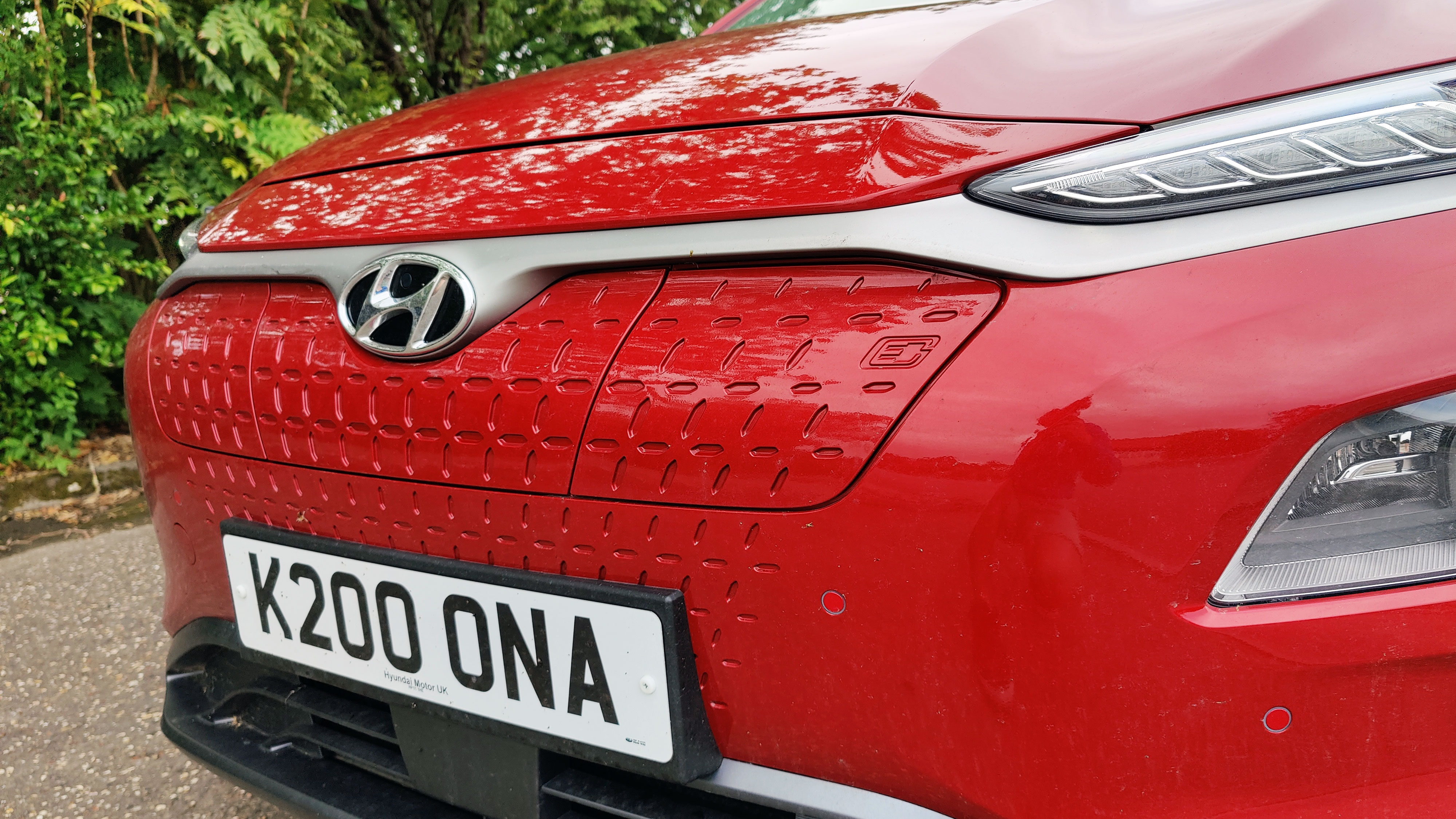
Hyundai bills the home charge cable as an emergency option, and charging times are incredibly slow via this method. For the 64kWh battery you're looking at 31 hours for a full charge, and 19 hours for the smaller 39kWh option.
However, if you're going to splash the cash on a fully electric car it would be worth investing in a wallbox charger at home, with a 7kW charger giving you a full tank in 9 hours and 35 minutes (or 6 hours 10 minutes if you have the 39kWh battery model).
Your best option for charging, however, is finding a 50kW public charging station, which will top the 64kWh battery up by 80% in 75 minutes (57 minutes for the 39Kwh model).
These aren't the sort of super-speeds that you see with Tesla's supercharger network, but again the Kona Electric is far more affordable, and its range is strong.
Hyundai Kona Electric specs and tech
The Premium SE model of the Hyundai Kona Electric is stacked full of tech. A 10.25-inch touch screen is the dominant feature atop the center console, providing controls for audio, maps, phone and car settings.
It's bright, clear and responsive to the touch, and while some features did take a moment to load, there weren't any unnecessary lengthy wait times.
The navigation is good, with clear guidance and turn directions beamed to the display in the instrument cluster and the heads up display (HUD) - but more on that shortly.
There's DAB digital radio and easy Bluetooth connectivity for your smartphone, allowing you to stream songs from your handset to the car's audio system. It also means you can make and receive hands-free phone calls via the Kona Electric's infotainment system, with on-wheel controls allowing you to easily manage volume, skip tracks and answer/hang up.
If you want more phone features available on that large display, the Hyundai Kona Electric also supports Apple CarPlay and Android Auto. This means you can connect your smartphone to the car via a USB cable and the port hidden behind a storage area at the base of the center console.
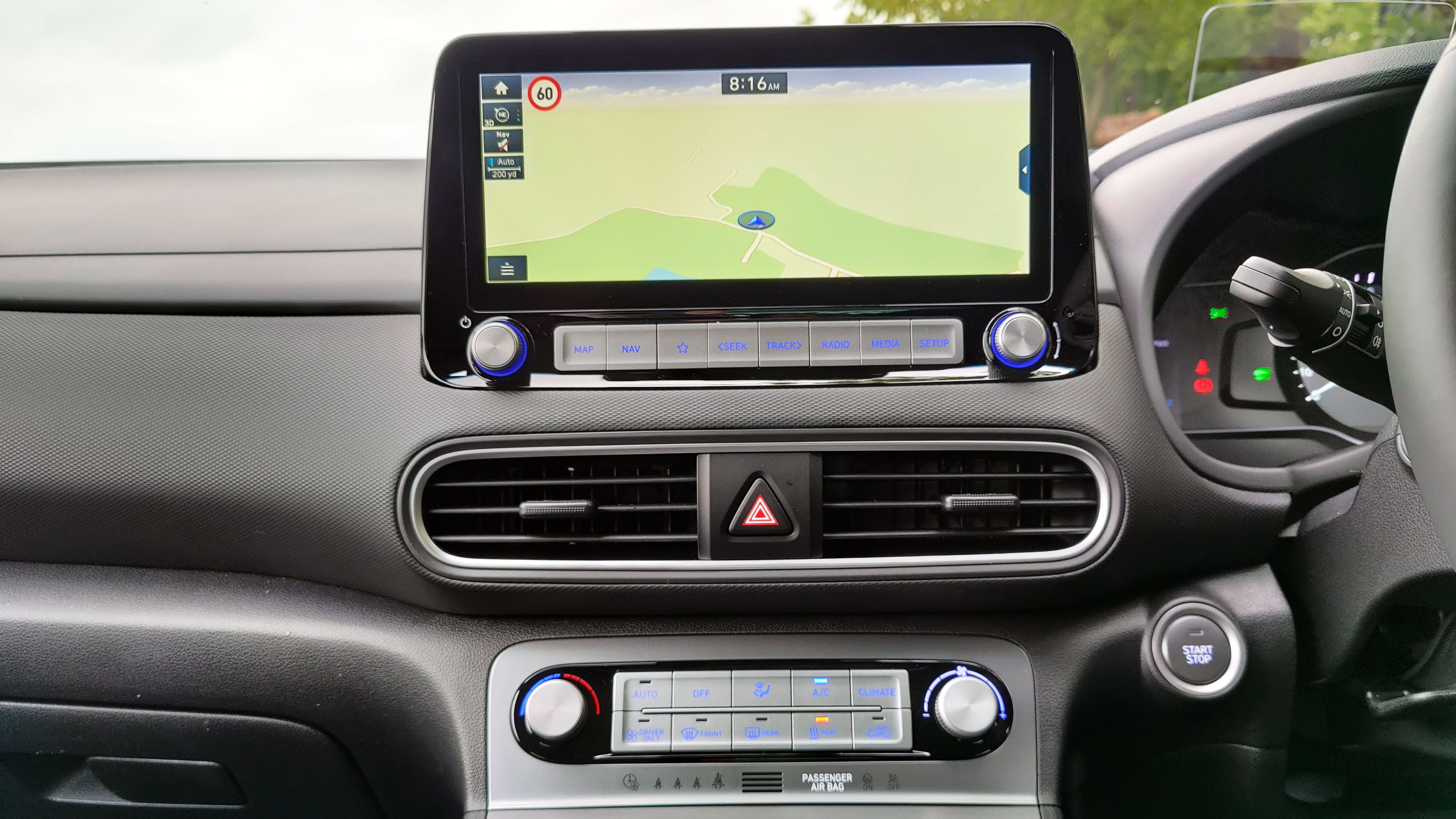
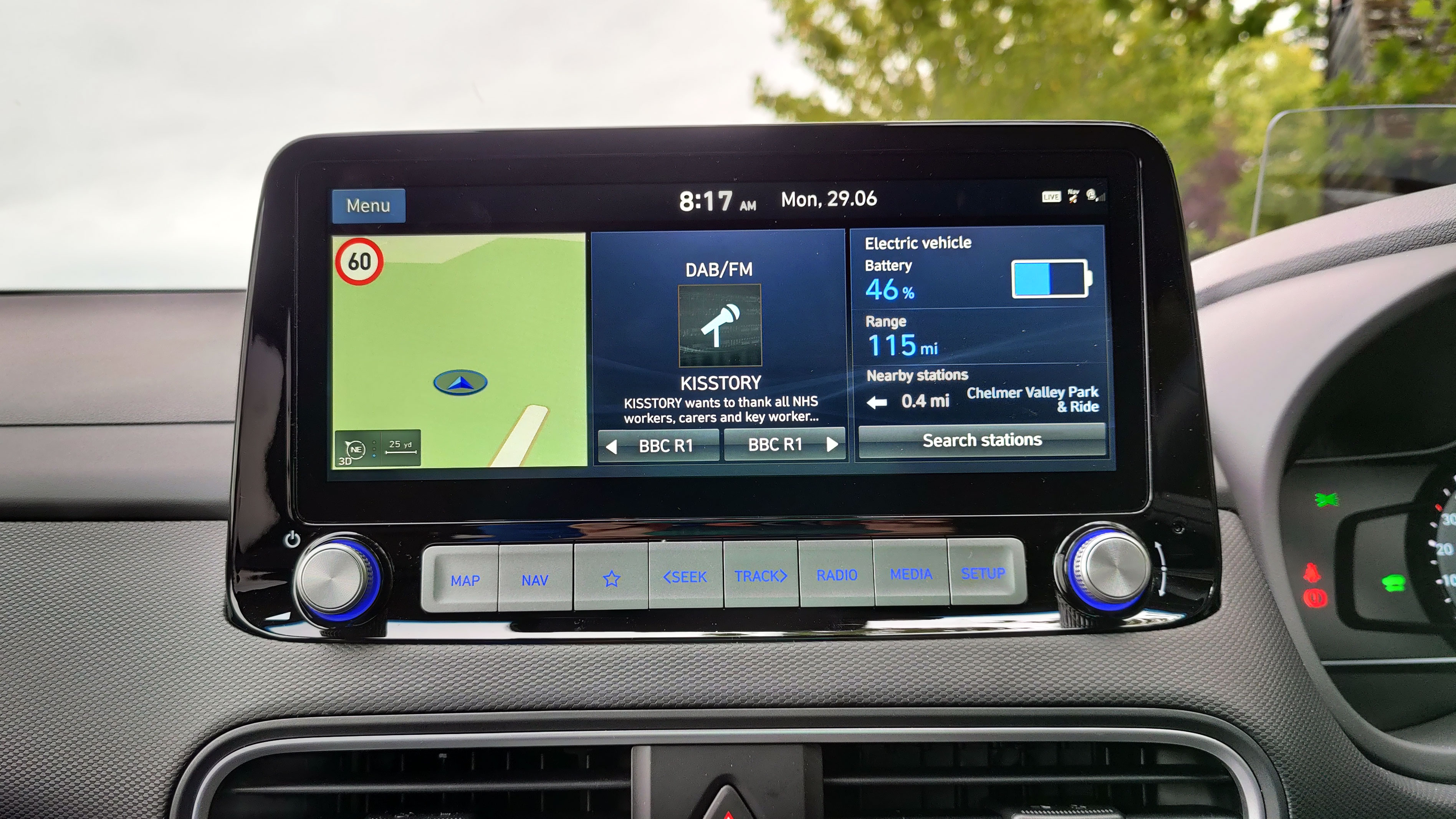
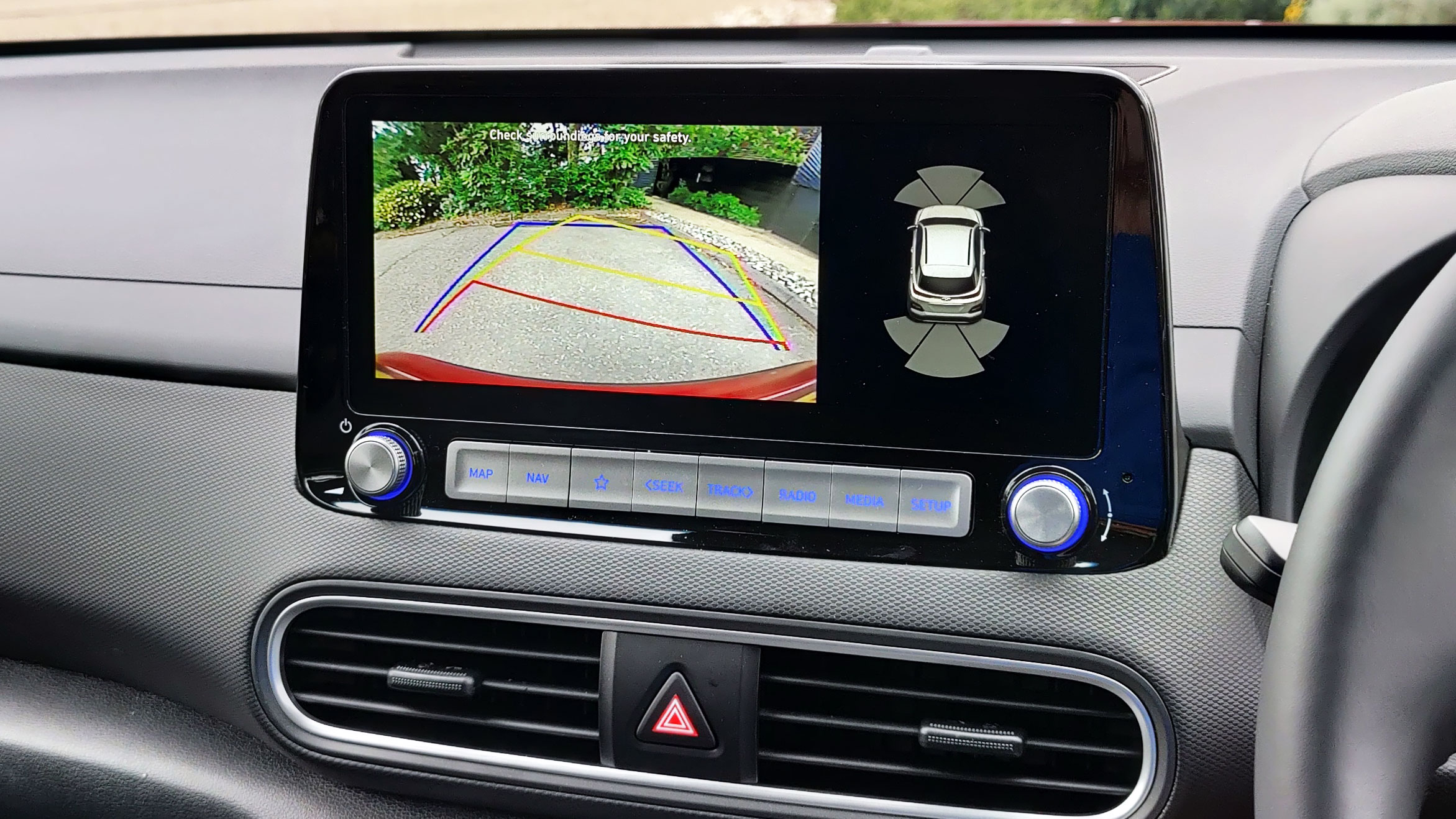
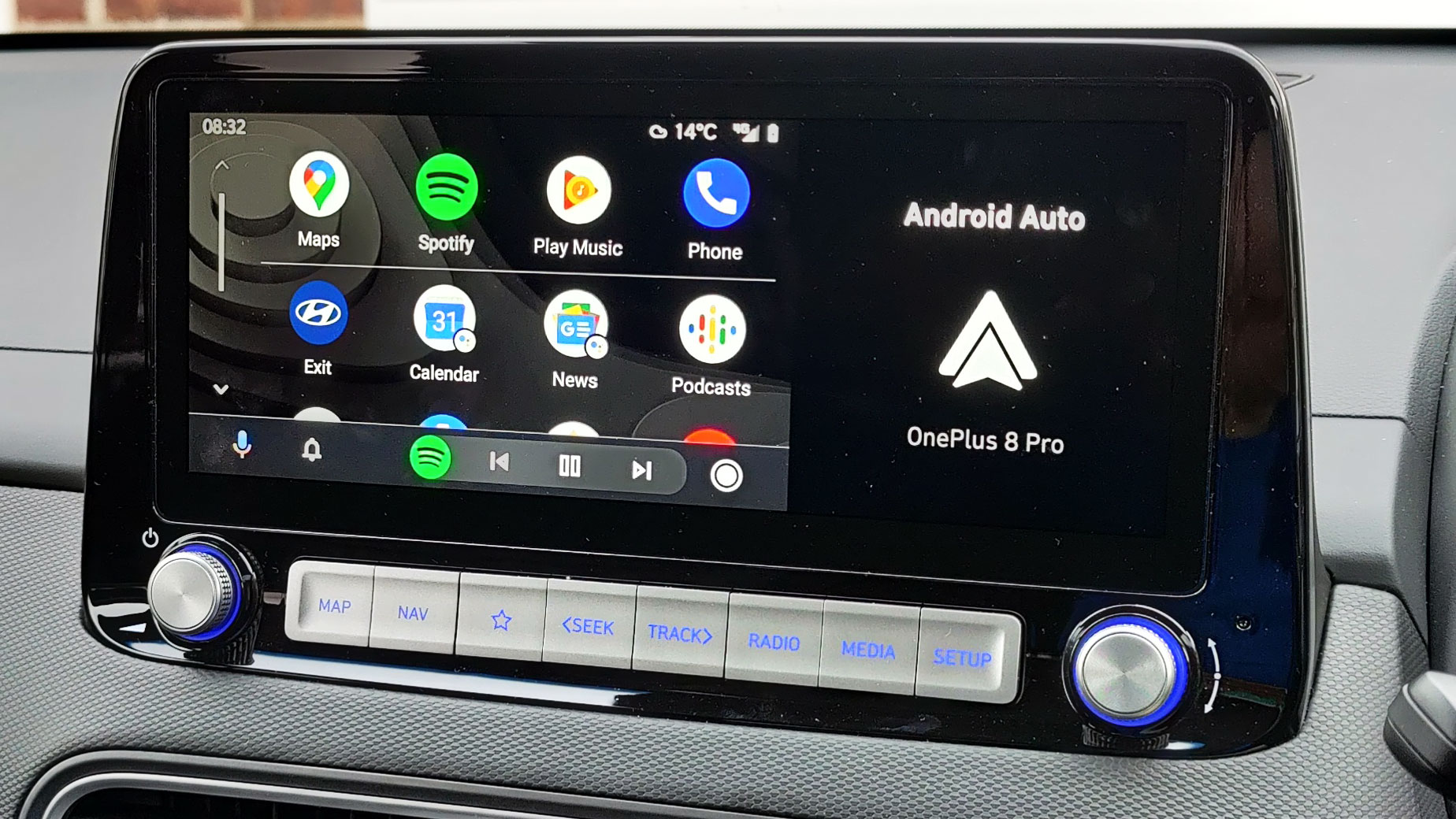
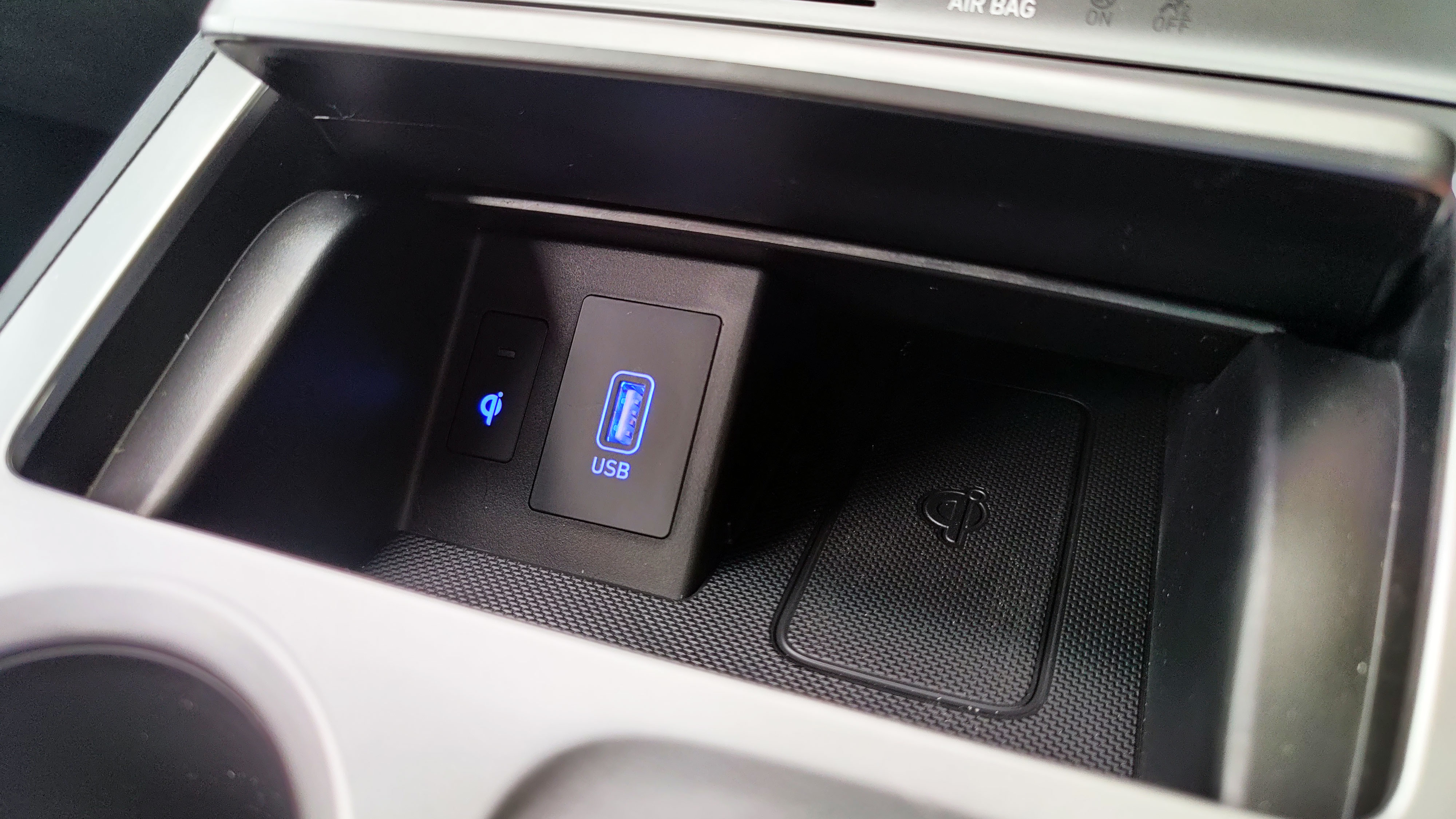
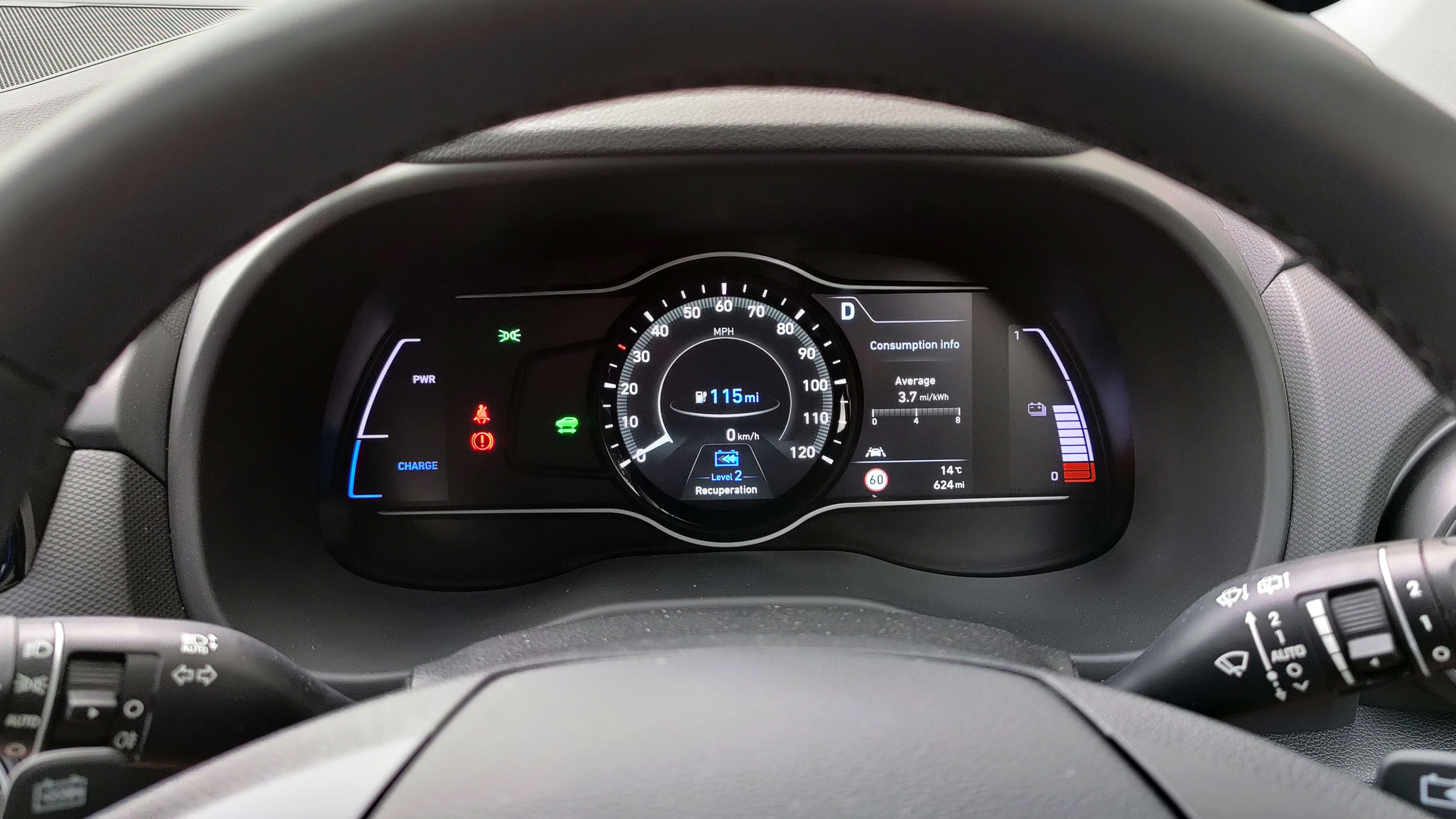
Press down on the cover to open the compartment, plug your handset in and then tap CarPlay or Android Auto on the main display. There's also a wireless charging page next to this USB port for phones which support the Qi wireless standard.
This hard-wired smartphone approach will give you access to some core mobile apps on the main display in the Kona, including Apple Maps, Google Maps, Messages, WhatsApp and Spotify.
The main display also comes in useful when parking, as it shows you a live feed from the rear camera, as well as providing visual alerts from the parking sensors around the vehicle, ensuring you don’t bump into your surroundings.
There's a second USB port along with a 12v port hidden away too, allowing your passenger to top up their phone as well.
As we've mentioned the Kona Electric also features a HUD, which puts core information such as your speed, the current road's speed limit and navigation cues into your eye line. We found the HUD was a little low for our liking (although we are quite tall, and it'll line up better for shorter drivers), but it did mean we didn't have to draw our eyes far from the road to check our speed.
You get a variety of driver aids as well with the Kona Electric, including adaptive cruise control, blind spot indicators, auto wipers and lights, and lane assist, which all help to make driving safer, easier and less taxing.
If you're looking for an affordable fully electric car with plentiful space, range and technology the Hyundai Kona Electric fits the bill nicely. It may not be the best looking, or fastest charging, but there's plenty of offer to keep you, and your passengers, happy.

- John McCann is getting behind the wheel to give you an alternative look at the wealth of cars – and the tech inside them – available today. From super-fast sports cars to tech-packed hatchbacks, he'll take you through a range of makes, models, power and price tags in his regular TR Drives column.

TechRadar's former Global Managing Editor, John has been a technology journalist for more than a decade, and over the years has built up a vast knowledge of the tech industry. He’s interviewed CEOs from some of the world’s biggest tech firms, visited their HQs, and appeared on live TV and radio, including Sky News, BBC News, BBC World News, Al Jazeera, LBC, and BBC Radio 4.